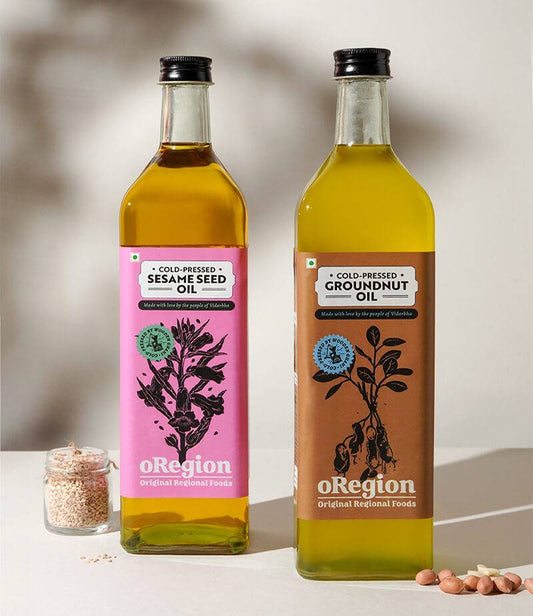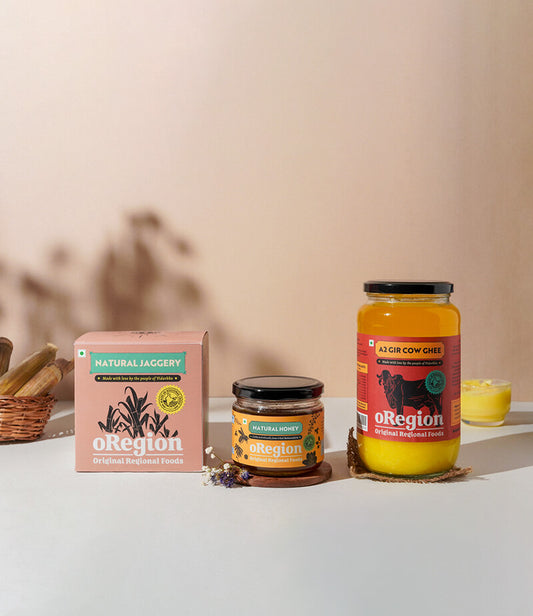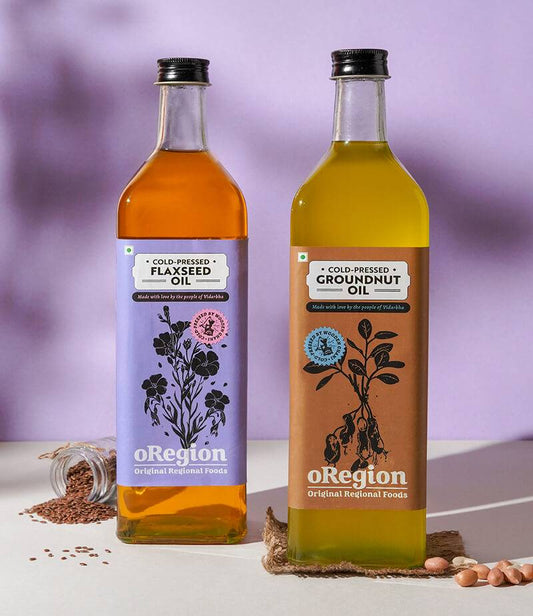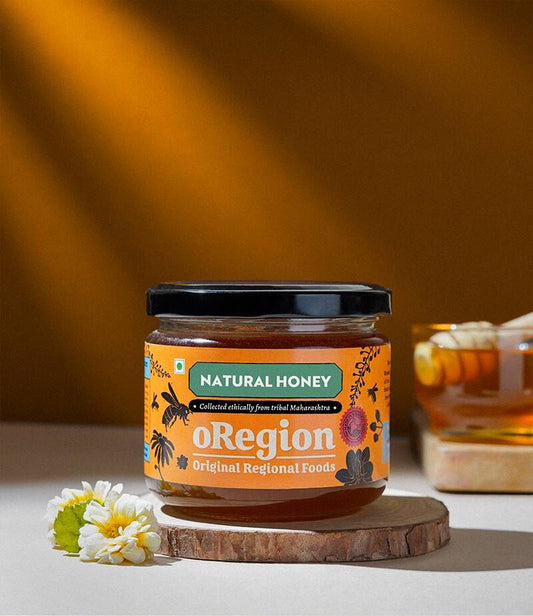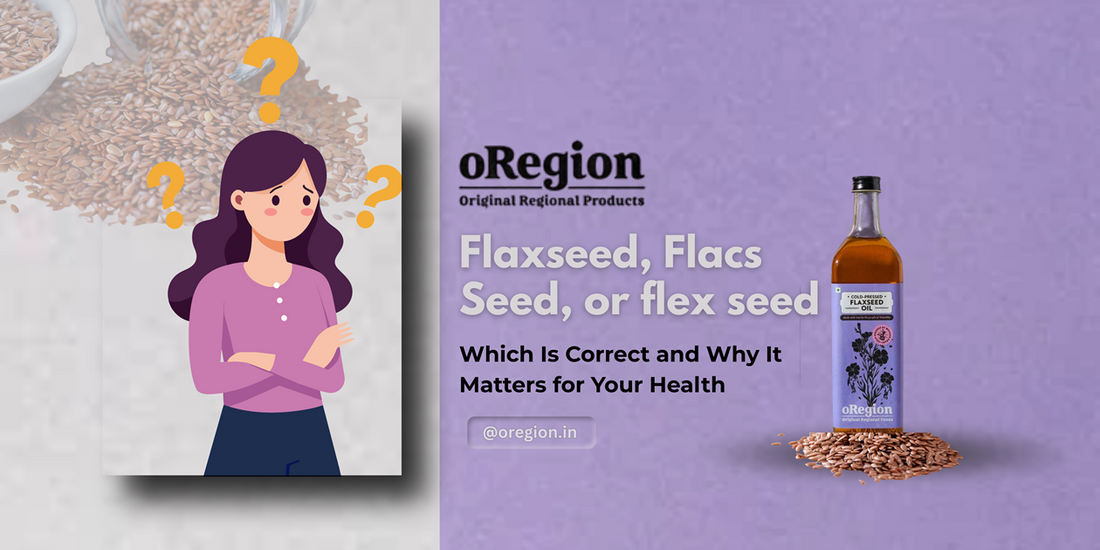
Flaxseed, Flacs Seed, or Flex Seed? Which Is Correct and Why It Matters for Your Health
By oregion foods“Jo sahi hai, wahi sehat ke liye bhi sahi hai.” In India, health conversations often begin at the dining table and flow into WhatsApp forwards and family advice. But what if something as simple as mispronouncing “flaxseed” can lead to confusion, wrong purchases, or even missing out on life-changing health benefits?
Understanding the Confusion Around Flaxseed Names
Nowadays, you’ll find people using a variety of names—Flacs Seed, Flex Seed, Flexid—when referring to the humble little seed packed with powerhouse benefits. But why does this confusion exist? Let’s dive deeper into each mispronunciation.
Common Mispronunciations: Flacs Seed, Flex Seed, and Flexid
-
Flacs Seed: This mispronunciation happens when people break the "x" sound in "flaxseed" into "c" and "s." It's common in Northern India, where phonetic spelling often leads to such variations.
-
Flex Seed: Many confuse "flax" with the more familiar word "flex," associating it with strength or flexibility. The unfamiliarity of "flax" makes "flex" a natural substitute in casual speech.
-
Flexid: A distorted version of “flex seed,” this term likely forms when “flex” replaces “flax” and an extra “id” is added—possibly influenced by similar-sounding words like “rapid” or “candid.”
These variations are not just typos—they come from everyday speech, regional accents, and even autocorrect tools. The result? A mixed bag of terms used across websites, packaging, conversations, and YouTube videos—making it harder for someone seeking the right product to find it.
What Is the Correct Term?
If you’ve been wondering “flaxs seed?” or seeing “flexid” on bottles, here’s the simple answer: the correct term is flaxseed (commercially also spelled “linseed” in some regions, but botanically the same).
The Origin and Meaning of “Flaxseed”
-
“Flax” comes from Old English flæx, tracing back to Proto-Indo-European leewo–, meaning “flax plant.”
-
“Seed” is plain and simple—a reproductive part of the plant. Together, they literally mean “seeds from the flax plant.”
-
Historically, flax has been grown for millennia for fabric (linen), oil, and health. The compound word flaxseed is well established in botanical and nutritional sciences.
How Dictionaries and Nutrition Experts Define It
-
Oxford English Dictionary (OED) defines flaxseed as “the seed of the flax plant, used as a source of oil.”
-
Merriam-Webster states: “the seed of the flax plant (Linum usitatissimum) used as food.”
-
Nutrition journals and certified dietitians worldwide use “flaxseed” (sometimes “linseed”) as the official term. A medical review titled Flaxseed: its botanical, nutritional and medicinal uses carries the name boldly .
Regional Variations and Pronunciations
-
In India, the Hindi term alsi is commonly used, and packaging frequently carries both “alsi” and “flaxseed.”
-
In Bangladesh, Nepal, and Pakistan, “alsi” is the household name, while “flaxseed” may appear on premium or English‐labeled product packs.
-
In South India, people may simply say “Java flax” or “Java alsi.” In Europe or the UK, “linseed” is more common, especially in garden or animal‐feed contexts, though in health stores “flaxseed” dominates.
The key is this: regardless of language or region, the botanical and nutritional identity remains the same—remember flaxseed as the official term.
Why It’s Important to Use the Correct Name
Choosing the correct name does more than clear up confusion—it’s about health accuracy, searching smart, and getting real benefits from products.
Better Health Awareness and Search Accuracy
-
Type “flaxseed benefits” in Google or YouTube, and you’ll get over 10 million search results filled with research-based health claims—from lowering cholesterol to soothing menopause .
-
Type “flexid benefits”? Almost nothing relevant shows up. You’ll miss credible studies, expert tips, and even the right products.
Avoiding Misinformation Online
-
Mislabelled “flex seed” posts abound, often pushing generic advice or even false claims. Reliable science—like meta-analyses on flaxseed and blood pressure—is nearly always found under “flaxseed.”
-
Using wrong terms may lead people to unverified rear-end pages or social media myths with no real citations.
Connecting with the Right Product and Benefits
-
If you buy “cold-pressed flaxseed oil,” versus something called “flexid oil” from an unbranded store, you may not be getting pure flax oil at all.
-
Accurate labeling (like Cold Pressed Flaxseed Oil by oRegion) ensures you're picking a trusted product with omega-3 ALA, lignans, and antioxidants—key to the nasal plains of health.
The Nutritional Power of Flaxseed
Now that we’ve cleared the name—let’s uncover what makes flaxseed a super‑nutrient treasure for all age groups.
Key Compounds: Omega‑3, Lignans, and Fiber
-
ALA (Alpha‑Linolenic Acid) – A plant-based omega-3 that competes with EPA/DHA from fish. It plays a role in heart health, anti‑inflammation, and brain function.
-
Lignans – Phytoestrogens that act as antioxidants and may reduce the risk of hormone-related cancers. Flaxseed has 75–800 times more lignans than other plant foods.
-
Dietary Fiber – A mix of soluble and insoluble fiber that helps digestion, stabilizes blood sugar, and supports gut flora diversity.
Flaxseed vs. Other Seeds: A Health Comparison
|
Seed Type |
Omega‑3 (ALA) |
Lignans |
Fiber Content |
Unique Benefits |
|
Flaxseed |
~22 g/100 g |
High |
27 g/100 g |
Lignans + ALA combo, heart & hormone support |
|
Chia Seeds |
~17 g/100 g |
Moderate |
34 g/100 g |
Gel-forming mucilage, unparalleled hydration |
|
Hemp Seeds |
~3 g/100 g |
Low |
4 g/100 g |
Rich in GLA, protein-dense |
|
Sesame Seeds |
~0.3 g/100 g |
Low |
12 g/100 g |
High in calcium, copper |
Flaxseed stands tall—not just for its omega‑3, but for its combination of lignans and fiber. This trifecta is rare among common seeds, making it a unique superfood get‑well‑kit for families of all ages.
Introduction to the Nutritional Power of Flaxseed
Flaxseed isn’t just a buzzword on trendy health blogs—it’s a centuries-old superfood now backed by modern science. This tiny seed, often underestimated, has shown an impressive nutritional portfolio that speaks volumes about its health-enhancing potential.
Why Flaxseed is Considered a Superfood
Ever heard the phrase “small but mighty”? That perfectly sums up flaxseed. Its classification as a superfood isn’t just marketing lingo; it’s based on the sheer volume of bioactive nutrients it holds:
-
Rich in Essential Fatty Acids: Specifically alpha-linolenic acid (ALA), an omega-3 that helps fight inflammation and supports heart health.
-
Packed with Antioxidants: Thanks to lignans, which are not only potent antioxidants but also act as phytoestrogens, flaxseed helps balance hormones naturally.
-
Fiber-Rich: With both soluble and insoluble fiber, it supports digestion, stabilizes blood sugar, and promotes weight loss.
But what sets flaxseed apart is its synergy. The combination of these nutrients doesn’t just add up—it multiplies the benefits. No wonder it's often recommended by dietitians, Ayurveda experts, and holistic doctors alike.
Key Nutrients and Bioactive Compounds in Flaxseed
Here’s what makes flaxseed a nutritional powerhouse:
-
Alpha-Linolenic Acid (ALA) – A plant-based omega-3 fatty acid crucial for heart and brain function.
-
Lignans – Flaxseed is the richest plant source of lignans, which help regulate estrogen and combat oxidative stress.
-
Dietary Fiber – One tablespoon of flaxseed delivers nearly 3 grams of fiber.
-
Proteins – Contains high-quality plant proteins, rich in glutamine and arginine, which support tissue repair and immune health.
-
Micronutrients – Includes magnesium, manganese, vitamin B1 (thiamine), phosphorus, and selenium.
Flaxseed literally nourishes your body from head to toe, from improving cholesterol profiles to enhancing skin glow.
Health Benefits of Regular Flaxseed Consumption
Here's how your body may thank you when you make flaxseed part of your daily diet:
-
Heart Health: Lowers LDL (“bad” cholesterol), raises HDL, and reduces plaque buildup in arteries.
-
Hormonal Balance: The lignans in flaxseed mimic estrogen and help with menopausal symptoms like hot flashes and mood swings.
-
Blood Sugar Control: Slows down the release of glucose, reducing insulin resistance.
-
Weight Management: Fiber increases satiety, which curbs cravings and unnecessary snacking.
-
Skin and Hair Health: Omega-3s help retain moisture and elasticity in skin while nourishing hair follicles.
Daily intake of 1–2 tablespoons of ground flaxseed or a teaspoon of cold-pressed flaxseed oil from trusted brands like oRegion can make a visible difference in your energy and wellness.
Potential Risks: Antinutrients in Flaxseed
As with any powerful food, flaxseed isn’t perfect. It contains:
-
Phytic Acid – Binds minerals like calcium and zinc, potentially reducing their absorption. However, soaking or roasting can reduce phytic content.
-
Cyanogenic Glycosides – Naturally occurring compounds that may form toxic cyanide in very high amounts. This risk is negligible at standard consumption levels but avoids overconsumption of raw seeds.
-
Laxative Effect – Due to high fiber, sudden excess intake can lead to bloating or loose stools. Start slow.
Despite these, the risks are minimal compared to the benefits—especially when consumed in moderation and properly processed.
Forms of Flaxseed Consumption and Their Effectiveness
Flaxseed is incredibly versatile. From whole seeds to oil, each form offers unique health advantages. But how you consume it significantly impacts its effectiveness.
Whole Flaxseed vs. Ground Flaxseed vs. Flaxseed Oil
-
Whole Flaxseed: Contains all the nutrients, but the hard shell makes it hard to digest unless chewed thoroughly. It may pass through the body undigested, offering fiber but minimal omega-3 absorption.
-
Ground Flaxseed (Alsi Powder): This is the most recommended form for consumption. It allows maximum absorption of ALA, lignans, and fiber. Best used fresh or refrigerated to preserve its oil.
-
Cold-Pressed Flaxseed Oil: Offers the purest form of ALA without the fiber. Great for heart and skin health but lacks lignans unless specified (lignan-rich oil).
For cooking, always go with cold-pressed flaxseed oil that’s not heated—ideal for salad dressings, smoothies, or post-cooking drizzle. Avoid frying or cooking flax oil at high heat; it ruins the omega-3 content.
Shelf Life and Storage Recommendations
-
Whole seeds: Last up to a year in a cool, dry place.
-
Ground flaxseed: Oxidizes quickly—store in the fridge in an airtight container; use within 3–4 weeks.
-
Flaxseed oil: Always keep it refrigerated after opening. Opt for dark-glass bottles (like oRegion’s premium oil) to protect from sunlight and maintain freshness.
Optimizing ALA and Lignan Bioavailability
Here’s how you make the most of your flax:
-
Grind just before use – Freshly ground seeds retain nutrients better.
-
Soak for a few hours – Activates enzymes, softens shell, reduces antinutrients.
-
Pair with vitamin C foods – Improves absorption of iron and minerals.
-
Use in multiple meals – Instead of one large dose, spread across breakfast and dinner for consistent nutrient release.
Hypocholesterolemic Properties of Flaxseed
Let’s talk about what flaxseed can do for your cholesterol. Studies consistently show that flaxseed helps lower LDL (bad) cholesterol, raise HDL (good), and improve overall heart function.
Flaxseed and Cardiovascular Risk Reduction
A tablespoon of flaxseed a day can work wonders. It:
-
Inhibits cholesterol absorption in the intestines.
-
Enhances bile acid production, drawing cholesterol from blood.
-
Improves arterial flexibility, reducing blood pressure strain.
Over time, this leads to reduced chances of heart attack, stroke, and clogged arteries.
Evidence from Clinical Studies
-
A 3-month trial at St. Boniface Hospital in Canada found that consuming 30g of flaxseed daily reduced LDL by up to 18%.
Another study published in The American Journal of Clinical Nutrition confirmed improved lipid profiles in patients with high cholesterol.
Meta-Analysis: Impact on Cholesterol and Lipoprotein Profiles
According to a 2022 meta-analysis of 25 RCTs (Randomized Controlled Trials), flaxseed supplementation significantly:
-
Lowered total cholesterol by 12–20 mg/dL.
-
Improved HDL to LDL ratios.
-
Reduced triglycerides in overweight individuals.
Benefits for Overweight and Dyslipidemic Individuals
If you're dealing with obesity, fatty liver, or metabolic syndrome, flaxseed can be your ally. It:
-
Reduces visceral fat and waist circumference.
-
Lowers C-reactive protein, an inflammation marker.
-
Helps balance lipid metabolism without side effects.
Incorporate flaxseed oil in your daily cooking routine—especially in raw form—to enhance its heart-friendly impact.
Hypotensive Effects of Flaxseed
Hypertension, or high blood pressure, is a silent killer affecting millions across India. It leads to heart disease, kidney failure, and stroke if unmanaged. Flaxseed, with its rich omega-3 and lignan content, has proven hypotensive effects—naturally supporting healthier blood pressure levels without harsh side effects.
How Flaxseed Helps Lower Blood Pressure
The blood pressure-lowering effects of flaxseed come from multiple mechanisms:
-
Alpha-linolenic acid (ALA) improves arterial elasticity, helping the blood flow more freely.
-
Lignans reduce oxidative stress and inflammation in blood vessels, easing pressure on artery walls.
-
Potassium and magnesium in flaxseed help balance electrolytes, essential for blood pressure regulation.
Moreover, the fiber in flaxseed supports weight loss, which indirectly benefits blood pressure control.
Clinical Evidence in Pre-diabetic and Hypertensive Populations
A landmark clinical trial from the Hypertension Institute of Canada showed that daily intake of 30 grams of ground flaxseed for 6 months resulted in:
-
10 mm Hg drop in systolic pressure
-
7 mm Hg drop in diastolic pressure
This effect was more pronounced in people with high baseline readings or metabolic syndrome. In India, where pre-hypertension is becoming increasingly common in youth and adults, such natural remedies can serve as preventive medicine.
Long-Term Benefits of Flaxseed Supplementation
Unlike pharmaceutical drugs that often lead to dependency, flaxseed offers long-term improvements without withdrawal or side effects. Continuous use can lead to:
-
Reduced vascular resistance
-
Improved circulation and nitric oxide function
-
Lowered resting heart rate
This makes it ideal for people looking for sustainable blood pressure support alongside lifestyle changes like exercise, meditation, and a healthy diet.
Hypoglycemic Effects of Flaxseed
With India being the diabetic capital of the world, natural blood sugar regulation is vital. Flaxseed plays a significant role here, offering a plant-based method to support insulin sensitivity and glycemic balance.
Impact on Fasting Glucose and Insulin Resistance
-
Soluble fiber in flaxseed slows down glucose absorption, preventing post-meal sugar spikes.
-
Lignans influence insulin metabolism and reduce oxidative damage in pancreatic cells.
-
ALA improves cellular glucose uptake by enhancing membrane function.
One study found that flaxseed consumption lowered fasting blood sugar by 19.2% in people with impaired glucose tolerance.
Preventive Role in Type 2 Diabetes
Flaxseed doesn’t just help those who already have diabetes—it can delay or prevent its onset. The insulin-sensitizing effect of ALA and lignans is especially helpful for:
-
Overweight individuals
-
People with PCOS or metabolic syndrome
-
Middle-aged adults with sedentary lifestyles
Regular consumption, especially as a part of traditional Indian meals (sprinkled on roti, dal, or smoothies), can make diabetes prevention more accessible and affordable.
Ideal Dosage and Timing for Glycemic Control
For maximum effect, nutritionists recommend:
-
1–2 tablespoons daily of ground flaxseed
-
Best consumed before meals to moderate glucose absorption
-
Alternatively, 1 teaspoon of oRegion Cold-Pressed Flaxseed Oil can also provide glucose control benefits
Don’t forget to pair it with physical activity and limit high-GI foods to get the best results.
Anticancer Properties of Flaxseed
Flaxseed has emerged as a powerful ally in the fight against cancer. While it’s not a cure, its preventive and supportive effects in various cancers—especially breast, colon, and prostate—are well-documented.
Lignans and Tumor Suppression
Lignans in flaxseed act like weak estrogens. They bind to estrogen receptors and block the stronger, harmful estrogens that fuel hormone-related cancers such as breast and ovarian cancer.
Studies have shown that women with higher lignan intake had lower risk of breast tumors and slower tumor growth.
Antiproliferative and Apoptotic Effects
-
Flaxseed extracts have been found to slow down the multiplication of cancer cells (antiproliferative).
-
They also trigger apoptosis, the process where abnormal or damaged cells self-destruct.
This combination helps prevent tumors from growing uncontrollably.
Synergistic Effect with Chemotherapy Drugs
When combined with chemotherapy:
-
Flaxseed may enhance drug efficacy.
-
It can reduce side effects like inflammation, oxidative stress, and organ damage caused by chemo.
-
Some studies even suggest flaxseed shortens the recovery time between cycles.
However, patients should always consult with their oncologist before introducing flaxseed in a therapeutic context.
Flaxseed Components with Antitumor Activity
|
Compound |
Cancer Defense Role |
|
Lignans |
Estrogen modulation, antioxidant |
|
ALA |
Anti-inflammatory, reduces cancer cell growth |
|
Fiber |
Detoxifies colon, reduces colon cancer risk |
|
Phenolic acids |
Scavenge free radicals |
It’s one of the rare foods that tackles cancer prevention from multiple angles—hormonal, inflammatory, cellular, and metabolic.
Anti-Inflammatory Properties of Flaxseed
Chronic inflammation is the root cause of many diseases—arthritis, heart disease, skin issues, and even depression. Flaxseed helps calm the body's internal fire through several pathways.
Effect on Systemic and Vascular Inflammation
Consuming flaxseed has been shown to reduce markers of inflammation such as:
-
CRP (C-reactive protein)
-
TNF-alpha
-
IL-6 (Interleukin-6)
This is especially useful for those with:
-
Rheumatoid arthritis
-
Asthma
-
Psoriasis
-
Inflammatory bowel conditions
Mechanisms of Anti-Inflammatory Action
-
ALA gets converted into EPA and DHA, which produce anti-inflammatory compounds like prostaglandins.
-
Lignans inhibit inflammatory gene expression.
-
Fiber promotes short-chain fatty acids in the gut, which improve immune function.
These combined effects result in less tissue damage, faster healing, and improved metabolic health.
Role of Linusorbs and Cyclopeptides
Lesser-known compounds in flaxseed, like linusorbs, have shown promise in immunomodulation:
-
They may help balance autoimmune responses.
-
Cyclopeptides from flaxseed possess antioxidant and antimicrobial effects, further supporting systemic wellness.
Flaxseed doesn’t just mask inflammation—it addresses its root causes.
Flaxseed’s Impact on Sex Hormones and Menopause Symptoms
Flaxseed, rich in phytoestrogens, can play a valuable role in balancing hormones—especially in women approaching or going through menopause. These hormonal shifts can cause a range of symptoms, from mood swings to hot flashes and irregular cycles. Flaxseed provides a gentle, plant-based solution to ease these changes naturally.
Lignans as Phytoestrogens
Lignans are compounds that mimic estrogen. But here’s the key: they don’t replace estrogen. Instead, they:
-
Balance excess or deficiency: Lignans can both increase and decrease estrogen activity depending on what the body needs.
-
Bind to estrogen receptors: This limits the impact of stronger, possibly harmful estrogens, helping reduce risks of hormone-related cancers.
-
Convert in the gut: Lignans are metabolized into enterolactone and enterodiol, which have mild estrogenic effects.
For women in perimenopause or menopause, this means more balance, fewer swings, and more energy.
Hormonal Balance and Enterolignans
Enterolignans, the active metabolites of flax lignans, help regulate:
-
Menstrual cycles
-
Hormonal acne
-
PMS symptoms
-
Mood fluctuations
Men can also benefit—enterolignans help maintain testosterone balance and protect prostate health. It’s hormone harmony in a tablespoon.
Reduction in Hot Flashes and Menopausal Symptoms
Research from Mayo Clinic found that women who consumed flaxseed daily experienced:
-
50% reduction in hot flash frequency
-
Improved sleep quality
-
Lower anxiety and depression symptoms
Flaxseed oil or ground flax (in smoothies or chutneys) can be a powerful ally for aging women who want natural hormone support.
Flaxseed as an Alternative to Hormone Replacement Therapy
Hormone Replacement Therapy (HRT) has known side effects—blood clots, cancer risks, and mood instability. Flaxseed provides:
-
A safer alternative with no synthetic hormones
-
A natural, plant-based option for those unable to take HRT
-
A preventive approach rather than a reactive fix
For Indian women dealing with menopause, especially in rural areas where medical access is limited, incorporating alsi (flaxseed) into meals is a powerful, traditional, and effective practice.
Flaxseed and Digestive Health
If your gut isn’t happy, your health won’t be either. The digestive benefits of flaxseed are vast—from relieving constipation to improving microbiome diversity.
Relief from Constipation and Improved Bowel Movements
-
The insoluble fiber in flaxseed adds bulk to stool and promotes regular bowel movements.
-
It acts as a natural stool softener, especially when consumed with water.
-
Elderly individuals or people with IBS can see gentle, consistent relief.
Unlike harsh chemical laxatives, flaxseed nourishes your gut and builds long-term digestive strength.
Positive Impact on Gut Microbiota and Intestinal Health
Flaxseed is a prebiotic, feeding the beneficial bacteria in your intestines. This supports:
-
Improved digestion
-
Enhanced immunity
-
Reduced bloating and gas
These good microbes also produce short-chain fatty acids (SCFAs), which protect the colon and reduce inflammation.
Increased Fecal Fat Excretion and Weight Management
Studies show that flaxseed increases the amount of fat excreted in feces. This means:
-
Reduced fat absorption = better weight management
-
Support for fatty liver reversal
-
Enhanced satiety and reduced calorie intake
Adding 1–2 tablespoons of flax powder to dahi, roti, or buttermilk is an easy and effective way to improve digestion and control weight naturally.
Reduction in Intestinal Permeability and Endotoxemia
“Leaky gut” or increased intestinal permeability can lead to fatigue, food allergies, and autoimmune disorders. Flaxseed:
-
Strengthens gut lining
-
Prevents endotoxins from entering the bloodstream
-
Reduces systemic inflammation
Think of it as a gentle repairman for your gut wall—fixing holes, sealing cracks, and protecting your system from toxic leaks.
Flaxseed and the Nervous System
Mental health and cognitive function are becoming priorities in modern India. Whether it's kids facing exam stress or adults navigating work burnout, flaxseed offers natural brain support.
Mental Fatigue and Cognitive Support
Flaxseed contains ALA, which:
-
Supports myelin sheath repair (essential for nerve function)
-
Reduces brain fog and fatigue
-
Helps you stay mentally sharp and focused
For students and professionals alike, regular flaxseed intake can enhance clarity and memory.
Mood Regulation and BDNF Enhancement
Flaxseed oil boosts the production of BDNF (Brain-Derived Neurotrophic Factor), a protein vital for:
-
Mood regulation
-
Anxiety and depression management
-
Emotional resilience
By balancing neurotransmitters like dopamine and serotonin, flaxseed works as a natural mood lifter.
Role in Supporting Brain and Psychological Health
Flaxseed:
-
Protects against age-related cognitive decline
-
Helps in managing ADHD symptoms
-
Reduces symptoms of postpartum depression when consumed by new mothers
Its anti-inflammatory and neuroprotective effects make it a brain food across all life stages—from childhood to elder care.
How to Identify Real Flaxseed in the Market
With fake health products flooding the Indian market, it’s critical to identify authentic flaxseed and flaxseed oil.
Label Reading Tips for Consumers
Look for:
-
“Cold-Pressed” or “Virgin” on flaxseed oil bottles
-
“Ground flaxseed” or “Alsi powder” with no added sugars or preservatives
-
Check ingredient list: It should only say “100% flaxseed”
Beware of labels like “flex seed,” “flexid oil,” or other variants—they may be misbranded or diluted with cheaper oils.
Trusted Sources and Product Authenticity
Stick with well-known brands like oRegion that offer:
-
Lab-tested, cold-pressed flaxseed oil
-
Freshly ground flaxseed in air-sealed pouches
-
Transparent packaging and verified user reviews
Also, check for FSSAI certification, manufacturing dates, and storage instructions for quality assurance.
Conclusion: Say It Right, Eat It Right
The difference between “flaxseed” and “flexid” might seem small—but in reality, it’s the difference between clarity and confusion, health and misinformation. Understanding the correct term not only sharpens your knowledge but leads you to real products that truly benefit your well-being.
Final Tips for Remembering the Correct Name
-
"Flax" = Fiber + Linseed + ALA + X-factor
-
Always spell it F-L-A-X-S-E-E-D, not “flex” or “flacs”
-
Teach kids and elders the right name—it spreads awareness
Whether you consume it as cold-pressed oil from oRegion, as a chutney mix, or in your daily atta, flaxseed is a health miracle we can’t afford to misname or misuse.
Spreading Accurate Information for Better Health
Language shapes habits. When we speak right, we search right. When we search right, we choose right. And that leads to better, longer, healthier lives.
So next time someone says “flexid oil,” smile and gently say: “You mean flaxseed oil. And yes—it’s amazing.”
FAQs
Q1: Is flaxseed the same as linseed?
Yes, flaxseed and linseed come from the same plant. “Flaxseed” is typically used in health and food contexts, while “linseed” is more common in industrial or European usage.
Q2: Can children and seniors safely consume flaxseed?
Absolutely! Flaxseed is beneficial for all age groups. Just adjust the dose—1/2 tsp for kids, 1 tsp for seniors. Always start with small amounts and increase gradually.
Q3: Is it better to eat flaxseed whole or ground?
Ground flaxseed is more effective. Whole seeds may pass undigested through the body, limiting the absorption of nutrients like ALA and lignans.
Q4: Can I cook with flaxseed oil?
Flaxseed oil should not be used for cooking or frying. Heat destroys its delicate omega-3 content. Use it raw—on salads, in smoothies, or after cooking.
Q5: Where can I buy authentic flaxseed oil in India?
Trusted brands like oRegion offer cold-pressed, virgin flaxseed oil that is FSSAI-certified and rich in Omega-3. Look for reputable e-commerce platforms or health stores.
Follow us for more wellness tips
-
📸 Instagram: @oRegion.in
-
📘 Facebook: facebook.com/oRegion.in
-
▶ YouTube: https://www.youtube.com/@oRegion_foods


